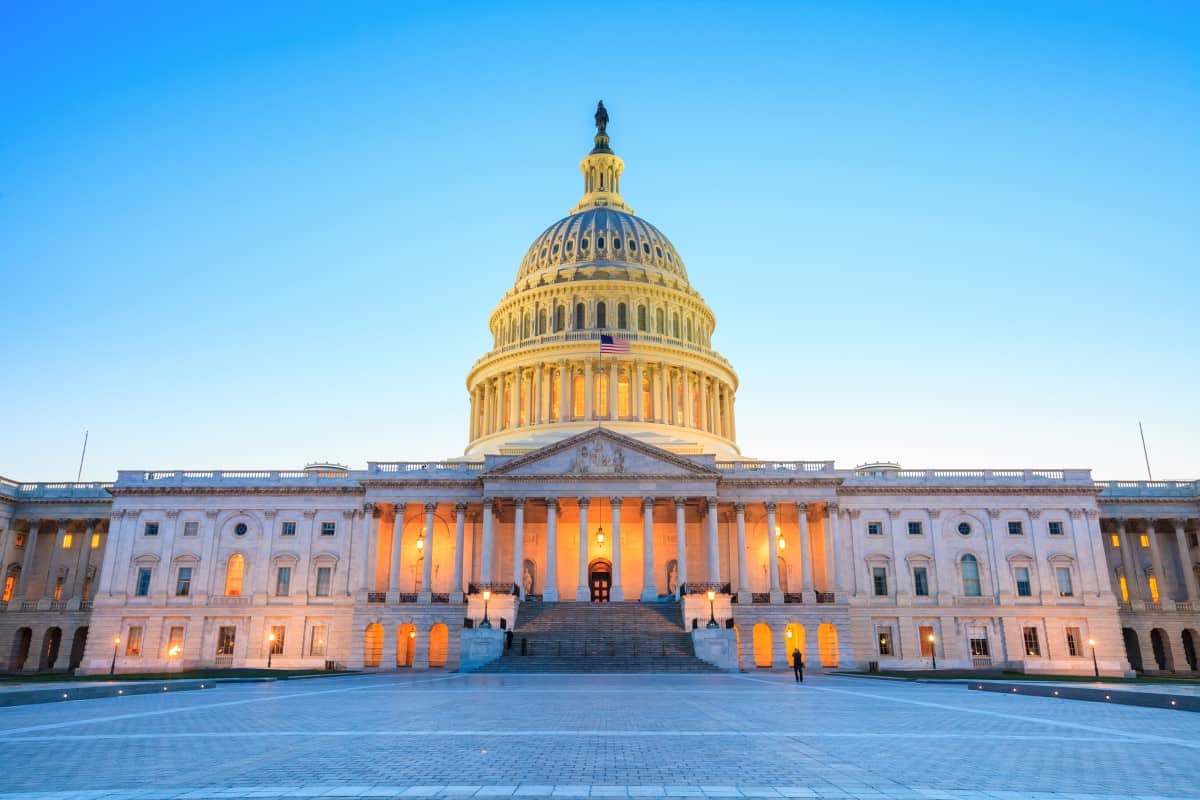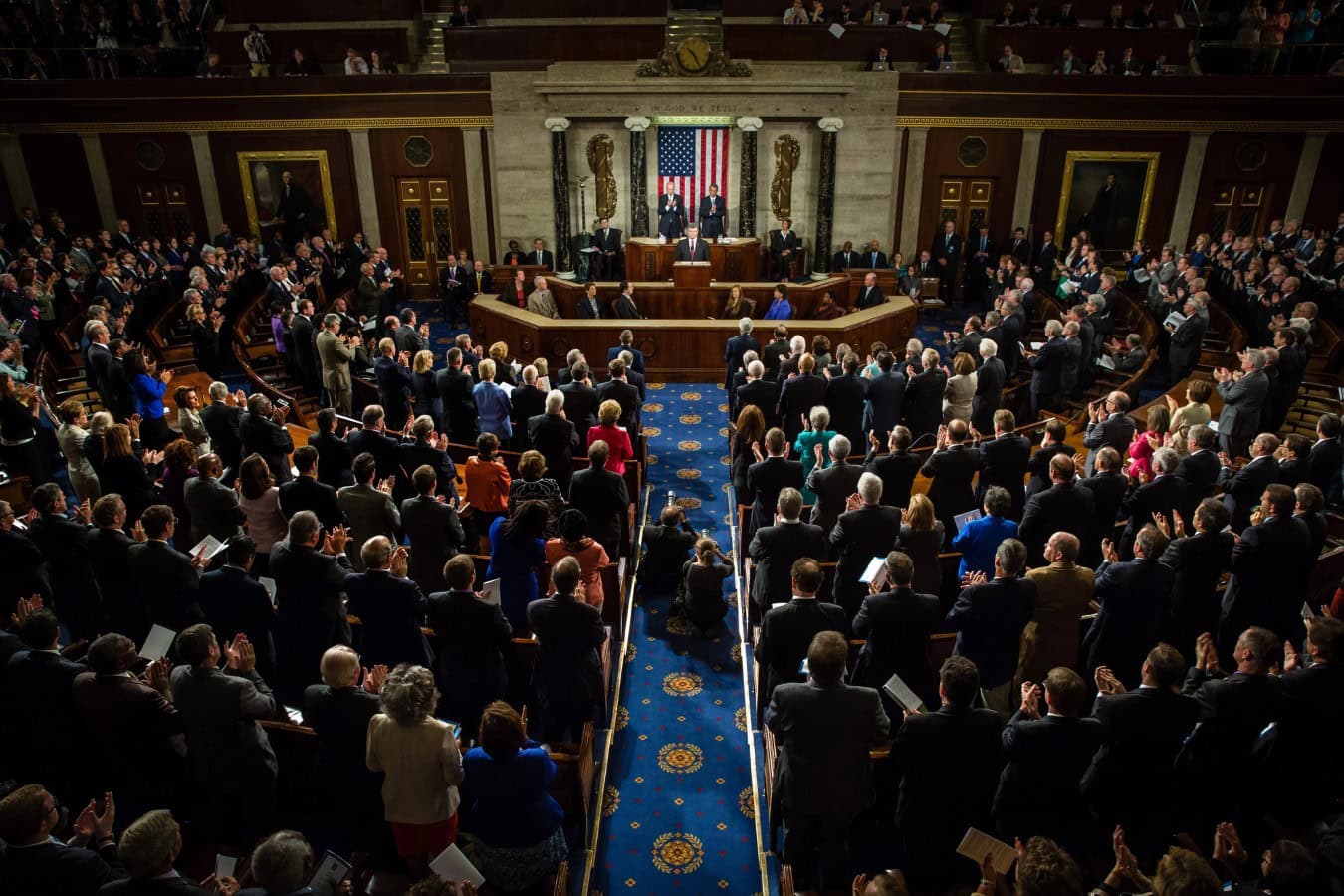Trump’s Tax Plan Hits A Snag In The Senate And Seniors On Medicaid May Pay The Price – Financial Freedom Countdown
Senate Republicans have unveiled their version of President Donald Trump’s sweeping economic package; a $4 trillion-plus tax overhaul and spending cut proposal that dramatically expands tax breaks while slashing healthcare funding and environmental subsidies.
Branded by Trump as the “One Big, Beautiful Bill,” the Senate’s draft sharpens some of the most controversial aspects of the House-passed plan and then goes even further.
Trillions in Tax Cuts, But at What Cost?

The Senate plan proposes trillions of dollars in tax cuts for businesses and households, preserving Trump’s 2017 tax cuts and adding new breaks, such as eliminating taxes on tips and creating deductions for seniors and charitable donations.
The bill also permanently extends three key business tax breaks.
To partially offset the cost, Republicans propose repealing clean energy tax credits and cutting Medicaid funding; actions that are already sparking fierce backlash from Democrats and even some GOP centrists.
Permanent Business Breaks for Corporations and Banks

Unlike the House bill, which phases out several provisions by 2029, the Senate version would make permanent:
The research and development deduction (benefiting tech and pharma),
Expanded debt interest write-offs (a boon for banks),
Full expensing for new equipment and machinery.
However, the Senate bill scales back a House proposal to boost the deduction for pass-through businesses from 20% to 23%, keeping it at the current 20%.
SALT Cap Battle is a Placeholder Now, Firefight Later

The bill holds the state and local tax (SALT) deduction cap at $10,000, despite House Republicans proposing a higher $40,000 cap.
This placeholder language delays resolution of one of the most politically volatile tax fights in high-income states.
Lawmakers from New York, New Jersey, and California have already threatened to derail the bill over this issue.
Medicaid Cuts Go Deeper Than the House Plan

States that didn’t expand Medicaid under the Affordable Care Act would be especially hard-hit.
The Senate version imposes stricter limits than the House bill on how states can fund their share of Medicaid. While the House plan would temporarily block new or higher taxes on medical providers, the Senate draft goes further by reducing how much non-expansion states can tax healthcare providers to support their Medicaid programs.
Some Republicans warn this could harm their constituents, setting up potential fractures in party unity.
Sen. Josh Hawley (R-Mo.) said Monday that he didn’t like the Medicaid proposals. “It sounds like we’re going to pay for that by defunding rural hospitals.”
A Blow to Clean Energy with EV and Solar Credits Axed

The bill targets clean energy subsidies for elimination:
Ends the $7,500 tax credit for electric vehicles within six months,
Repeals credits for wind and solar projects,
Eliminates credits for rooftop solar systems, both for leasing and direct purchase.
Industry leaders say the move could devastate an already struggling solar sector and stall progress toward energy transition goals.
Modest Gains for Families and Seniors

The Senate version introduces:
A permanent $2,200 per-child tax credit, less than the $2,500 temporary credit in the House bill,
A new $6,000 senior deduction,
A $2,000 charitable deduction for non-itemizers (compared to $300 in the House bill).
It also imposes limits on itemized charitable deductions for wealthier households; part of a broader GOP push to cap high-end tax benefits.
Trump’s Campaign Promises Included, But Trimmed

While Trump championed eliminating taxes on tips and overtime pay, the Senate bill introduces caps:
$25,000 cap on tax-free tips,
$12,500 cap on overtime exemption.
These limits reflect internal GOP negotiations as budget concerns clash with campaign trail promises.
Endowment and Foundation Taxes Softened

The bill scales back proposed taxes on elite universities:
Endowment tax maxes out at 8%, versus 21% in the House version.
Senate version drops the House proposal to tax large private foundations, like the Gates and Rockefeller Foundation.
These changes weaken efforts to target large institutional wealth, a move criticized by Democrats.
Deficit Fears Mount as Debt Ceiling Raised

The Senate proposal raises the debt ceiling by $5 trillion, $1 trillion more than the House bill.
Yet it’s unclear whether the plan includes enough spending cuts to justify even the original $4 trillion tax package.
Fiscal conservatives are warning that without at least $1.5 trillion in cuts, the bill could blow a hole in the federal deficit, driving up borrowing costs for households and businesses.
Academic Defense vs. Economic Warnings

Trump allies point to academic studies suggesting that lower corporate taxes drive investment.
A new study led by Kevin Hassett, head of the White House’s National Economic Council found that every 1-point drop in the user cost of capital led to a 1.68 to 3.05 point boost in investment.
But other economists caution that further tax cuts will worsen the deficit and push up interest rates, creating long-term pressure on economic growth.
GOP Leaders Race Against the Clock

Senators have until July 4 to pass the bill and send it back to the House. With only a three-vote margin in the Senate, Republican leaders are scrambling to unify their caucus and avoid a default scenario if the debt ceiling isn’t raised before the Treasury runs out of options in mid-August.
The bill’s rushed timeline and unresolved disputes; from SALT deductions to Medicaid cuts threaten to derail what Trump has dubbed his legacy-defining economic plan.
Final Approval Far From Certain

Though Republican leaders hope to avoid major revisions, pressure from centrists, high-tax state representatives, and Medicaid defenders could force last-minute changes.
Without broader consensus, the bill risks being rejected or stalled, potentially endangering both Trump’s economic agenda and the nation’s creditworthiness.
A High-Stakes Gamble

The Senate GOP’s version of Trump’s “One Big, Beautiful Bill” offers massive tax cuts and delivers on key campaign promises; but at the cost of Medicaid coverage, clean energy investment, and deficit discipline.
As the July 4 deadline looms, one thing is clear: the battle over this bill will test the limits of Republican unity, and reshape the economic landscape for years to come.
Like Financial Freedom Countdown content? Be sure to follow us!

More than 2.6 million Americans have received long-awaited retroactive Social Security payments, with an average payout of $6,710. The Social Security Administration (SSA) confirmed in a June 6 announcement that 94% of eligible retirees have already received their updated benefits following the passage of the Social Security Fairness Act. More than 3.2 million people were set to receive higher Social Security benefits under the newly enacted Social Security Fairness Act. In February, the SSA announced they will begin issuing one-time retroactive payments by the end of March, compensating beneficiaries for missed increases dating back to January 2024. These payments will be deposited directly into bank accounts SSA has on file, though some recipients may see funds before receiving an official notice in the mail.
Crypto in Your 401(k)? New Rule Opens the Door, But Retirees Should Think Twice

In a sweeping reversal of prior policy, the Department of Labor (DOL) has made it easier for employers to include cryptocurrency in workplace retirement plans. The agency rescinded 2022 guidance issued under the Biden administration, which had urged employers to exercise “extreme care” before offering crypto investments in 401(k)s. The new approach, led by Trump appointees, signals a shift toward a more hands-off regulatory stance.
Crypto in Your 401(k)? New Rule Opens the Door, But Retirees Should Think Twice
The $1 Million ‘Starter Home’ Is Now Reality in 233 Cities. Has the American Dream Collapsed?

In 2025, the American dream of homeownership faces a stark reality. In 233 U.S. cities, even a modest starter home now costs $1 million or more. This dramatic shift, detailed in Zillow’s latest housing market analysis, underscores the growing affordability crisis confronting first-time buyers nationwide.
The $1 Million ‘Starter Home’ Is Now Reality in 233 Cities. Has the American Dream Collapsed?

During his 2024 campaign, Donald Trump pledged that seniors would no longer pay taxes on their Social Security benefits. But that promise is notably absent in the new Republican tax bill making its way through Congress. The One Big Beautiful Bill Act; named after one of President Donald Trump’s signature phrases fulfills several of his campaign pledges, including a temporary end to taxes on tips and overtime pay. However, it stops short of eliminating taxes on Social Security benefits, a key demand from many seniors. Still, the bill offers some tax relief for older Americans through other measures.
Trump’s Social Security Tax Cut Stalls Amid Senate Roadblocks

Did you find this article helpful? We’d love to hear your thoughts! Leave a comment with the box on the left-hand side of the screen and share your thoughts.
Also, do you want to stay up-to-date on our latest content?
1. Follow us by clicking the [+ Follow] button above,
2. Give the article a Thumbs Up on the top-left side of the screen.
3. And lastly, if you think this information would benefit your friends and family, don’t hesitate to share it with them!

John Dealbreuin came from a third world country to the US with only $1,000 not knowing anyone; guided by an immigrant dream. In 12 years, he achieved his retirement number.
He started Financial Freedom Countdown to help everyone think differently about their financial challenges and live their best lives. John resides in the San Francisco Bay Area enjoying nature trails and weight training.
Here are his recommended tools
Personal Capital: This is a free tool John uses to track his net worth on a regular basis and as a retirement planner. It also alerts him wrt hidden fees and has a budget tracker included.
Platforms like Yieldstreet provide investment options in art, legal, real estate, structured notes, venture capital, etc. They also have fixed-income portfolios spread across multiple asset classes with a single investment with low minimums of $10,000.